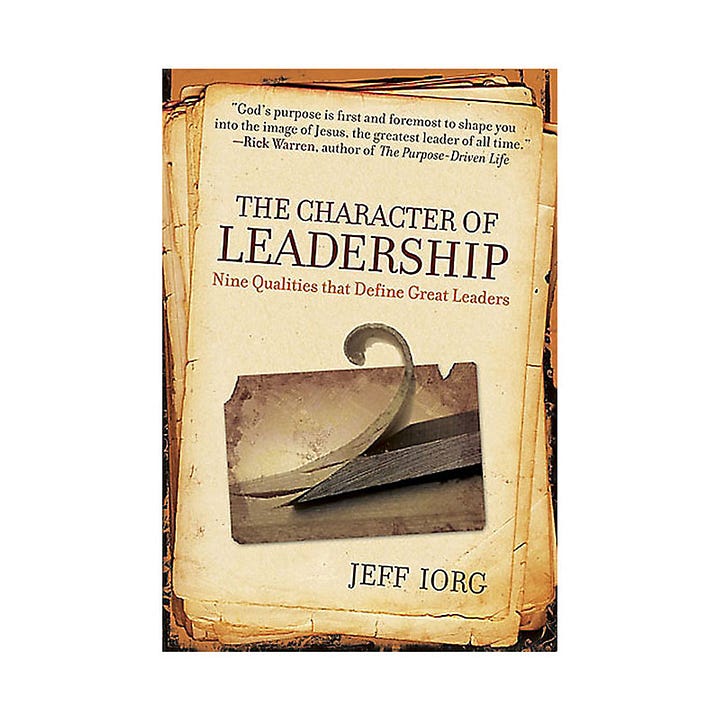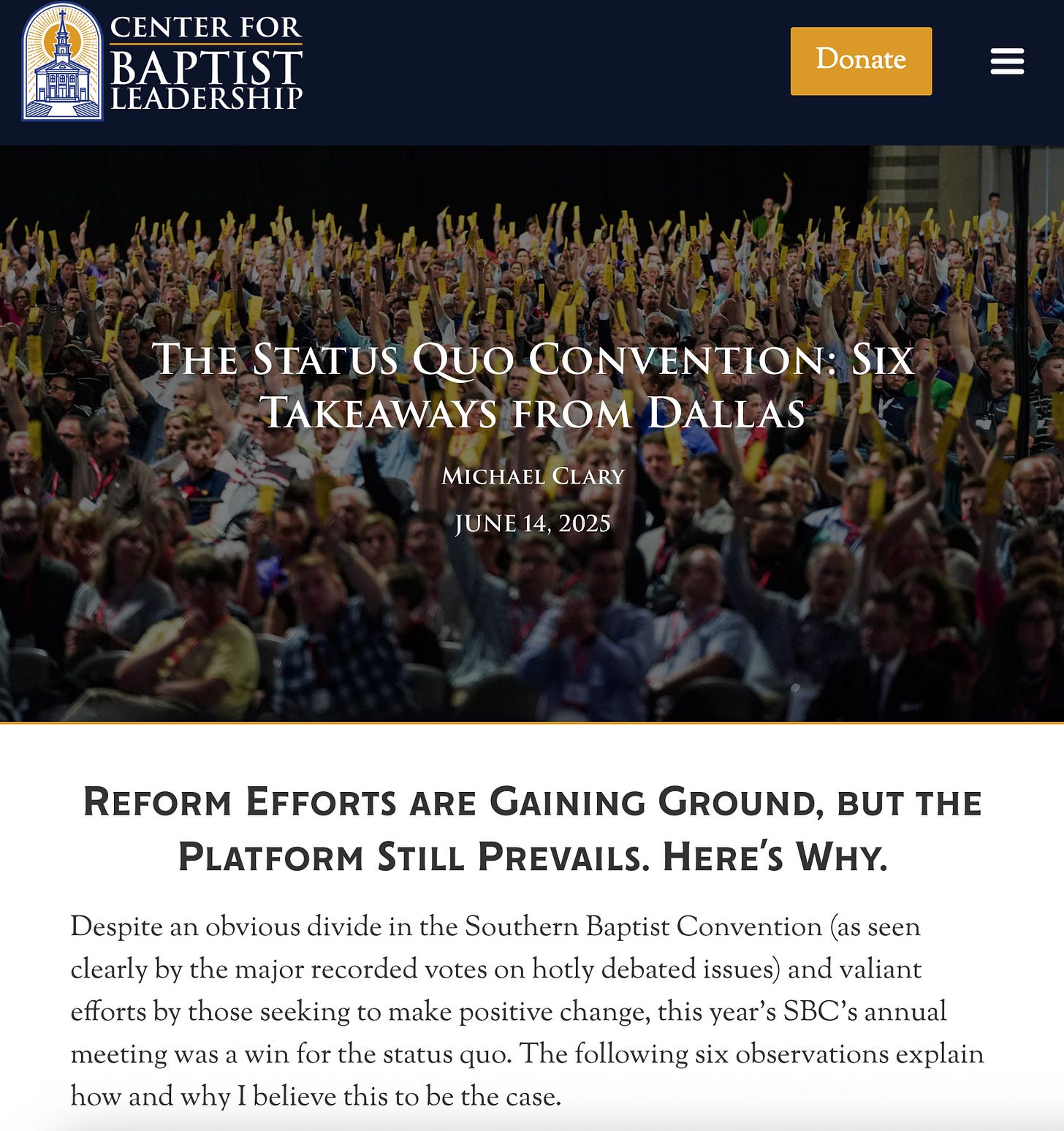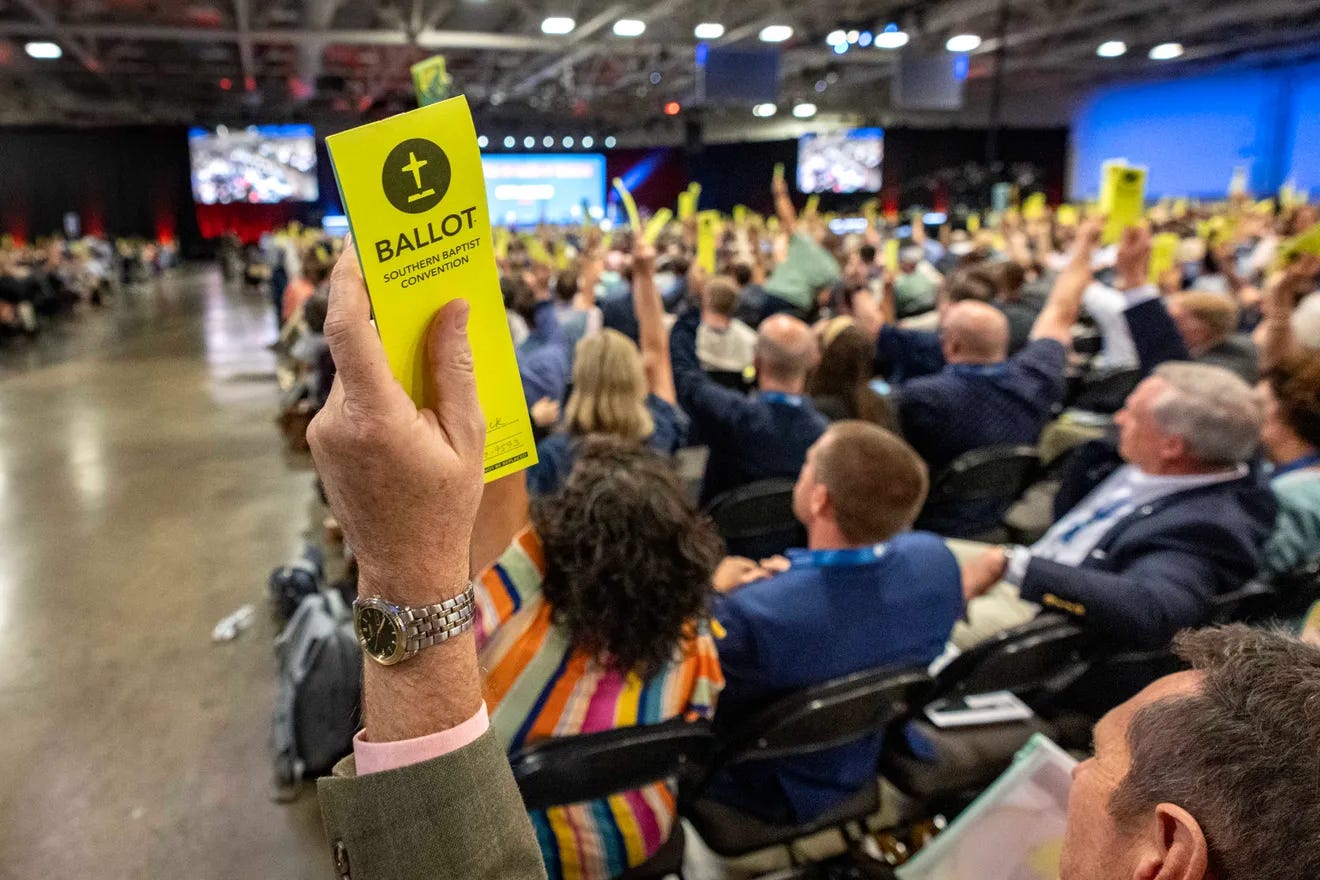The Status Quo Convention: Six Takeaways from Dallas
Reform Efforts are Gaining Ground, but the Platform Still Prevails. Here’s Why.
My latest piece reflecting on the 2025 SBC convention just dropped at the Center for Baptist Leadership, for which I’m a contributing scholar. I’m Republishing it here in case you don’t see it elsewhere.
The Center for Baptist Leadership is doing excellent work advocating for reform in the SBC. The CBL event at the convention featuring Steve Deace was an absolute grand slam. If you aren’t familiar with CBL, check out their website and follow them on X.
Reform Efforts are Gaining Ground, but the Platform Still Prevails. Here’s Why.
Despite an obvious divide in the Southern Baptist Convention (as seen clearly by the major recorded votes on hotly debated issues) and valiant efforts by those seeking to make positive change, this year’s SBC’s annual meeting was a win for the status quo. The following six observations explain how and why I believe this to be the case.
1. There are four main groups in the SBC: 1) the Platform, 2) the Reformers, 3) the Loyalists, and 4) the Normies.
First, the Platform. These are the guys on stage who control the agenda and run the SBC bureaucracy. Think of everyone representing the SBC Executive Committee, primarily the President and CEO of the Executive Committee, Jeff Iorg, as well as the Committee on Order of Business (a quietly powerful committee that controls the schedule of the annual meeting), the entity heads, and others. And don’t forget the parliamentarians and the lawyers (who absolutely have their own agenda, and you would be naive to believe that they don’t).
They’re a mixed bag. One major positive on the Platform this year was that SBC President Clint Pressley did a commendable job running the meeting. In the past, we’ve seen presidents work against the Reformers, but not this year. This year, it appeared that other Platform players were working against him. More on that in a moment.
Second, the Reformers. I count myself amongst this group. We are the ones who see the SBC slowly but surely heading over a cliff and are advocating for needed fixes and reforms to our theology, public witness, and internal Convention operations that we believe would revitalize the Convention, defend our Baptist distinctives, and most importantly, honor the Lord. Three reform efforts from this year stand out in particular: the call for financial transparency, the Law-Sanchez Amendment, and the abolition of the ERLC. The Reformers represent the concerns of the majority of local churches in the SBC, but they are not usually men with “institutional” power or positions.
Third, the Loyalists. These are individuals who support the Platform in public debates on their entity-sponsored blogs and as messengers from the floor. They are loyal to the Platform because they want to be the Platform. Their highest aspiration in ministry is to become an SBC “insider.” The siren song of the Inner Ring is calling their name. Some of them may share the Reformers’ concerns, but don’t see the need for making dramatic changes. Furthermore, they know that if they ever publicly support the Reformers, even if they agree in private, it might cost them their chance to advance up the denominational ladder.
The Loyalists are dispositionally committed to prioritizing “tone” over substance. To them, the Reformers sound too “angry,” too “radical,” or too “fundamentalist.” They are the “business as usual” crowd, and for them, business is booming. They probably left the convention happy.
Finally, the Normies. To clarify, I don’t use this term as a pejorative, so please don’t interpret it that way. In an ideal world, the SBC is run so well that all of us are “Normies.” The Normies don’t follow SBC politics or issues closely (and in many ways, who can blame them), so they attend the Convention and vote based on their perception of the room at any given moment. I suspect most of them are laymen and women in their churches who love the Lord and expect to discover whatever they need to know while at the Convention.
The problem here is the dynamic of how they learn what they “need to know” during debate on the Convention floor; if they haven’t done their own research, they are forced to make split-second decisions based on who they trust more—a local church pastor like Rhett Burns or Juan Sanchez or the President of the EC and his army of lawyers.
All four groups have their own agendas, which guide their actions. In Dallas, the Platform worked with the Loyalists to run the show and was often joined by the Normies to win the votes. The Reformers certainly won many of the Normies on the vote to abolish the ERLC, and even more on the vote to pass the Law-Sanchez Amendment; however, ultimately, the powerful combination of the Platform and Loyalists prevailed.
2. The SBC Annual Convention is a massive advertising campaign.
This is a significant point that drives several further observations, which are developed below. Where 10,000 Baptists are gathered in Jesus’ name, advertisers will be in their midst. I’m not talking about advertising from sponsors outside the Convention, I’m talking about the Convention advertising itself to the messengers. In other words, in many ways, the Convention is like a giant commercial for itself. Here’s what I mean.
The genius of the Cooperative Program lies in its bottom-up strategy, which facilitates cooperation between independent churches, combining, amplifying, and multiplying our individual efforts in ways that (ideally) do not compromise our Baptist polity. The Baptist Faith and Message (ideally) gives every cooperating church the confidence that their Cooperative Program (CP) giving supports like-minded work. Many churches that exist today do so only because Southern Baptists of previous generations gave generously to the CP to raise up Baptist pastors and plant Baptist churches. I should know.
I was trained for ministry at the Southern Baptist Theological Seminary (SBTS), where I was able to afford tuition due to subsidies enabled by CP dollars. I then planted an inner-city church in Cincinnati through the SBC’s Nehemiah Project in 2008. The pipeline from pew to classroom to mission field is richly funded by Southern Baptist generosity, and we owe it to them to honor their faithful giving.
But CP giving is voluntary. And CP giving is down. As such, to me, the messaging at the Convention seemed designed to justify that commitment to the messengers. The CP funds the Platform, and the Platform controls the messaging at the annual meeting. This creates an incentive for the platform to showcase all the great work the CP is doing while suppressing any messaging that would call its value into question.
Again, since CP giving is voluntary, it is the primary product being sold at the Convention. The Platform wants its product to shine brightly before its biggest audience to maintain the loyalty of its customer base.
Simply put, the Cooperative Program is a product, the Platform is selling it, and the messengers are the customers.
This gave the Convention a palpable salesmanship kind of feel to me. Anyone who’s raised support for missionary work knows that you have to inspire potential donors with powerful stories of life change. Some presenters asked for the sale directly: “Please continue your generous support for the Cooperative Program.” Others were more indirect: “Here’s how your Cooperative Program dollars are working for you!”
Of course, advertisers will not allow the weaknesses of their product to ever see the light of day. That’s why the Reformers are such a nuisance to the platform. We’re regarded as trolls giving one-star reviews for their product. Why pay attention to them?
We are not regarded as sincere brothers trying to do good—we’re seen as a marketing threat. If our concerns gain traction, it could erode confidence in the Cooperative Program, and funding could dry up (even though we believe and argue that we want to strengthen the CP, not harm it). That must not be allowed to happen.
All of these factors favor the status quo. As long as the money is coming in, the Platform can continue doing whatever they’re doing while confidently proclaiming, “This is the Lord’s work! Look at all God is doing! You have nothing to be concerned about. Just trust us.” This leads me to my next observation.
3. The Convention spends far too much of its precious time on celebration instead of business.
The SBC is a massive, sprawling organization comprising millions of people and hundreds of millions of dollars. There are numerous groups and subgroups within the SBC, each seeking to utilize the annual meeting to achieve their objectives. The SBC has six major seminaries and other major entities, all of which require airtime to present reports, address questions, and justify their allocation of CP dollars. Again, they’ve got to sell their product.
And yet, the annual meeting is supposed to be a business meeting. There’s a lot of work to be done, and we have only two days to do it. Think about that. Ten thousand people are trying to conduct business in 48 hours. Except it’s not even 48 hours, it’s far less. The actual business sessions are shockingly short. Debate is aggressively limited.
This fact alone favors the status quo. Reform takes time. To make changes, you need time to present your case to the voting body, many of whom have not considered the issues beforehand. More complex issues will be more resistant to change because there is insufficient time for debate and discussion. The more the Platform restricts time for floor motions and debate, the less likely real change will take place, favoring the status quo.
Therefore, to put it bluntly, the Convention isn’t a church service and shouldn’t pretend to be. We have 52 Sundays every year to worship God in our local churches. And since we believe that “all of life is worship,” we know that we can worship God through a rigorous business meeting that devotes the time needed for a robust debate on important issues, just as much as we can by singing along to Shane & Shane.
Yes, the music was very well done, but much of it was unnecessary. Likewise, it isn’t a conference. There are numerous excellent conferences to attend, featuring outstanding preaching and music. But that’s not what the SBC annual meeting is for. Worship is more than music; it is a lifestyle, and our greatest act of worship is obedience.
These things take precious time away from more urgent matters. If each session began by singing one hymn and an opening prayer from the president, we could get down to doing serious business. The singing and preaching elements function like a filibuster, leaving little time for any unpleasant business to come to the floor that might damage the reputation of the Cooperative Program. Perhaps this is by design. If Platform leaders profit from perpetuating the status quo, there is an incentive to schedule the Convention (and fill the schedule) in a way that maintains it.
In my opinion, the Convention would be well served by eliminating these “Christian conference trappings” and acting more like a business meeting. As it currently stands, however, the music and preaching create expectations that this is a conference, and the more messengers view this as a conference, the less patience or interest they’ll have in conducting business.
4. The Reformers are gaining ground, but it’s an uphill battle.
It’s no secret that the Reformers have their sights set on the Ethics and Religious Liberty Commission, which they view as a rogue and corrupted entity. This year, Florida pastor Willy Rice made a motion to abolish the ERLC, saying, “I defended the ERLC for years, but I can’t anymore.” Brent Leatherwood has become a controversial figure since taking over for Russell Moore at the ERLC, yet he only had to take one question from the floor. The ERLC is a black eye on the SBC, and clearly, Leatherwood has friends on the Platform who were able to minimize his exposure to public scrutiny (or help drive positive press for him by placing the ERLC booth front and center in the exhibit hall).
The Reformers have been making great arguments on several issues for years, and Rice’s recent change of heart is but one indication that we’re gaining ground. But we’re fighting an uphill battle. The Platform controls the business of the Convention and can run the schedule in a way that limits negative PR from the microphones on the floor. The Loyalists function as an extension of the Platform, amplifying their agenda through floor speeches and applause, influencing the mood of the room. The Normies are often uninformed about the issues at hand, having not followed the news since the last convention. When one lacks information and is unsure how to vote, they read the room for cues on what to do. This favors the Platform and the Loyalists against the Reformers.
And the closer it gets to lunchtime, the more likely they’ll vote for whatever enables them to beat the lunch crowd at Lupes. The Platform will sometimes schedule votes with “hangry” messengers in mind. Thus, the Reformers are at a disadvantage. To be sure, this is an understandable and even expected use of political power by the Platform to maintain its position against any changes that threaten the status quo and, by extension, its control. I’m not lamenting the reality of political maneuvering; I’m pointing it out so that the Reformers (and hopefully the Normies) can better identify it, counter it, and, Lord willing, one day wield it for good ends.
We also have another disadvantage. Our case relies on presenting facts and data that can persuade an uninformed audience in under three minutes. The Platform has the advantage of being trusted by the Normies, its ability to control the schedule, support from Loyalists on the floor, and easy access to the mainstage mics, allowing them to put their thumb on the scale as needed in the moment.
EC President Jeff Iorg (a salaried position paid for by Cooperative Program dollars) did not have to stand at a microphone and wait to be called on by the moderator. He was able to speak from the “trusted and respected” position on the platform, opposing two motions brought by Reformers, effectively killing both, by making false claims and emotional appeals that the reformers had no opportunity to refute. It takes time and effort to build a case with facts, evidence, and reasoning, all of which can be easily dismantled with scare tactics from the Platform.
For example, after Juan Sanchez made his motion regarding the Law Amendment that would clarify and strengthen the SBC’s commitment to appointing only biblically qualified men to the office of pastor, Iorg warned (in an untimed response) that such a measure would bring defamation lawsuits against the SBC, capitalizing on litigation fatigue from the past few years. Colin Smothers put it well when he said, “‘Pursue faithfulness unless it might get you sued’ is not a Christian argument.” We should not fear litigation more than we fear God.
Ironically, someone should buy Iorg a copy of his own book, The Character of Leadership, which says, “fear is sinful when it makes you do something you know is wrong or you do not want to do. People such as Elijah (1 Kings 19:3), Peter (Mark 9:6), Sarah (Gen. 18:15), and Isaac (Gen. 26:7) all had this experience. Fear can cause you to go along with questionable decisions or allow others to control you. You are disgusted with yourself but cannot seem to hold your ground. When that happens, fear has control” (p. 184).
After Rhett Burns made his motion about financial transparency, Iorg claimed that SBC entities were not trying to hide anything, and adopting such a measure would “send a signal” that the SBC is subjecting itself to government oversight. This claim is false. Burns’ motion made no such provision.
Again, you can’t help but wonder if Iorg remembers what he wrote in his leadership book. Regarding financial transparency, he said, “I have heard ministry leaders say, ‘If you trust me to teach you the Word of God, you should trust me to handle the money without looking over my shoulder.’ Red flag! That arrogant attitude will destroy integrity. Find out how to account for every dollar in your ministry…and do it! Safeguards must be put in place, documentation must be produced, and care must be taken to be completely above reproach when it comes to money.”


Point taken, Dr. Iorg. You have given us many red flags. But in the end, Iorg’s “trust us” message won the room. Then we went to eat BBQ.
5. Uninformed messengers are vulnerable to emotional manipulation.
In the end, it doesn’t matter who makes the best arguments. Humans are emotional creatures and, more often than not, we vote with our hearts. This is marketing 101. Returning to my point about advertising, we make purchasing decisions based on emotions, not just facts. Women don’t buy shampoo that makes their hair the cleanest; they buy shampoo that convinces them it will make them beautiful.
In the SBC, I’m convinced the same dynamic is at work. We will support it as long as we believe doing so will win lost souls and advance God’s kingdom. The Platform receives funding from Cooperative Program dollars, so their incentive is to promote the Cooperative Program to us with compelling stories of God’s work through Southern Baptist missions from around the world, while telling us, “pay no attention to the man behind the curtain.”
In this way, “mission” has become a magic wand to make any unpleasant SBC business disappear. “Mission” is the ultimate multi-tool in the SBC used to justify ignoring any problem in our midst, no matter how glaring. If money is being grossly mismanaged beneath many layers of obfuscation, “that’s a distraction from winning the lost and accomplishing the Great Commission!”
If churches are undermining our mission by violating scripture’s prohibition of women pastors, “you’re trying to prevent women from using their gifts in the Kingdom of God!” If the ERLC is using the SBC’s money and influence to advance policies that most Southern Baptists would oppose, “we’ve helped crisis pregnancy centers get ultrasound machines!”
A fear of conflict always favors the status quo. And all it needs to prevail is for good men to do nothing.
6. Finally, and despite all this, I’m proud to be a Southern Baptist and will continue to support Reform efforts.
One of the highlights coming out of the Convention was our clear support for biblical marriage and a call to repeal the Supreme Court’s Obergefell decision that invented “gay marriage.”
We passed Resolution Five which states, “RESOLVED, That we call for the overturning of laws and court rulings, including Obergefell v. Hodges, that defy God’s design for marriage and family; and be it further RESOLVED, That we call for laws that affirm marriage between one man and one woman, recognize the biological reality of male and female, protect children’s innocence against sexual predation, affirm and strengthen parental rights in education and healthcare, incentivize family formation in life-affirming ways, and ensure safety and fairness in female athletic competition.”
Yes, and amen. When clear matters are brought to a floor vote without the Platform leaders putting their thumbs on the scale, you can count on Southern Baptists to speak with biblical clarity.
To be frank, I was really discouraged last year. But this year, I’m not. I’ve come to realize that reform efforts take years. Although this year’s convention was a win for the status quo, I’m convinced we are winning the argument on a multi-year campaign to get our message out. It’s working.
I’m convinced there are many “Willy Rices” out there who will be similarly convinced in the years ahead that there are urgent problems in the SBC that can be corrected if we take the necessary action. Southern Baptists are resistant to change, but given time and the right information, we will make the right decision. I’m certain that the rank-and-file SBC members in the pews would agree with the positions advocated by the reformers. We need to keep making our case.
For my fellow Reformers, I urge you, don’t blackpill. I’ve seen many voices on social media saying things like “Get out now!” and “The SBC is totally compromised!” and “There’s no hope for the SBC!” Well, that’s their opinion. Most of those people are former SBCers who need to justify their decision by recruiting more defectors into their ranks. Don’t join them.
This was a disappointing convention in many ways, but I refuse to abandon the greatest gospel preaching institution the world has ever seen. I’ve been in the SBC for over 16 years. My church was planted through the Southern Baptist Convention and funded with Cooperative Program dollars. We would not exist were it not for the SBC.
Finally, I also caution against binary thinking, seeing the SBC as “all wheat” or “all weeds.” Binary thinking like this is usually emotionally driven, and we need more sober-mindedness these days. Just as the wheat and weeds grow alongside one another in the world, we should expect the SBC to be no different.
The SBC has problems, I’ll be the first to acknowledge that. However, I know many more faithful, godly pastors and churches in the SBC than I can count.
Stay strong, my friends. Let’s continue our reform efforts between now and next June. Shout on, pray on, we’re gaining ground. Glory hallelujah!
And Lord willing, I’ll see you in Orlando.







Thanks, Michael. I, too, was at the SBC Annual Meeting and I, too, was disappointed at the "trust us" attitude that came from the platform. I do need to do my homework on the "990" issue that Iorg and Mohler invoked.
Could you go into the issues you have with the ERLC? At first, it just seemed as if folks didn't not appreciate them moving in lockstep with Trump's agenda but I know it's deeper than that.
Thanks for your incredibly thoughtful article.